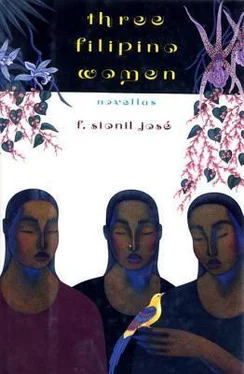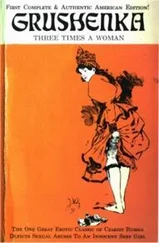Francisco Jose - Three Filipino Women
Здесь есть возможность читать онлайн «Francisco Jose - Three Filipino Women» весь текст электронной книги совершенно бесплатно (целиком полную версию без сокращений). В некоторых случаях можно слушать аудио, скачать через торрент в формате fb2 и присутствует краткое содержание. Год выпуска: 2013, ISBN: 2013, Издательство: Random House Publishing Group, Жанр: Современная проза, на английском языке. Описание произведения, (предисловие) а так же отзывы посетителей доступны на портале библиотеки ЛибКат.
- Название:Three Filipino Women
- Автор:
- Издательство:Random House Publishing Group
- Жанр:
- Год:2013
- ISBN:978-0-307-83028-9
- Рейтинг книги:4 / 5. Голосов: 1
-
Избранное:Добавить в избранное
- Отзывы:
-
Ваша оценка:
- 80
- 1
- 2
- 3
- 4
- 5
Three Filipino Women: краткое содержание, описание и аннотация
Предлагаем к чтению аннотацию, описание, краткое содержание или предисловие (зависит от того, что написал сам автор книги «Three Filipino Women»). Если вы не нашли необходимую информацию о книге — напишите в комментариях, мы постараемся отыскать её.
and
-examine the Philippine experience through the lives of three female characters, a prostitute, a student activist, and a politician.
Three Filipino Women — читать онлайн бесплатно полную книгу (весь текст) целиком
Ниже представлен текст книги, разбитый по страницам. Система сохранения места последней прочитанной страницы, позволяет с удобством читать онлайн бесплатно книгу «Three Filipino Women», без необходимости каждый раз заново искать на чём Вы остановились. Поставьте закладку, и сможете в любой момент перейти на страницу, на которой закончили чтение.
Интервал:
Закладка:
I went to the university. Now, I regretted that I did not know her friends, that I had considered them muddle-headed adolescents unfamiliar with the realities of power — things that an economist or a businessman like myself understood almost as second nature.
Alone, confined to the prison of this skin, this skeletal frame, this net of nerves which relayed nothing but my own despair, I wondered about what I did not know so that I could have restrained her. I was nagged by lassitude, by feelings of worthlessness. Mornings: hard-boiled eggs, sugarless coffee, the prattle of people, the noxious gases of a deadened city, and a vigil in the morgue of evening. I would lie in the dark aching for the phone to ring, a taxi to stop before the house, wondering where she was and the hopes that we had fed on.
Alone, I would wander around Ermita and go to my favorite bar. I never stayed long; the roasted squid and the San Miguel were tasteless, and the jokes I heard were stale. The curfew was an excuse to go home early and though the apartment depressed me, it also sustained me. I developed a tightness in the chest which Dr. Alvarez said was a heart condition that given my youth, I should not have. My legs seemed edemic and my feet were always cold. I was absentminded, I could not function well and I easily forgot names, words, places. I suffered hallucinations and would see things from the corner of my eye which were not really there. Sometimes, I imagined things moving on my desk, the pencil holder, the stapler. Was this what love could do? Its ineffable essence? Malu was right, after all; the mind could afflict the body, too.
Alone, I really had nothing to covet but memories and they came alive at the mere mention of places or names; with them, I was often mesmerized, oblivious to the turmoil around me, the clatter of living. Where could she be now? With whom was she sharing the night? Who was listening to her laughter? Once, driving in Makati, I saw her — or someone like her — hurrying on the sidewalk across the street. I slammed on the brakes, left the car where I had stopped and crossed over, unmindful of the traffic that bore down on me, but when I reached the corner where I thought I saw her, she was gone.
Alone, I sometimes walked the palm-shaded lane by the seawall. The breeze would waft the acrid tang of the sea, now polluted by tidal wash. We had been here several times, usually after visiting Mother in the old Ermita house, and here we watched the sun go down in a splash of reds and golds, waited for the night to take over and the bay and the night above it become one vast blackness sprinkled with stars. All over the world it was dark, so why then could I not live with this gloom? This was the order of things and I should not let it frighten me, intimidate me into thinking that I could not escape it. Her father, after all, had hope and very soon, he would walk in the light again.
I visited the chapel in Navotas. Aling Atang, the priestess, could not tell me where she was other than that she was with friends and that she was always in great danger. But they would try and bring her back. The next time I visited, I could not understand at first when she made-believe and talked to an imaginary Malu with me. She asked how she was, how her father was getting along. She conducted the conversation as if Malu was there answering all her questions.
We went to the prayer meeting and it was the same — all the members acted as if she was with me, as if nothing was wrong. Aling Atang told me afterwards that they had done this every week, prayed as if Malu was in their midst. They would reach out to her and she would then return.
Following their example, I imagined her at the breakfast table, beside me in the car, in bed when I went to sleep. Once the maid who cleaned the apartment and brought the food which Mother always sent, caught me talking alone. She must have thought my mind had snapped for Mother came that evening. She tried to persuade me to return to the house in Ermita.
Like a man with terminal cancer, I was ready to try anything.
Maybe the ritual worked after all. It took an eternity. The fourth year of martial law; one evening in May — I had by then taken to meditation as she had suggested — the phone rang.
“Teng-ga, I am glad I reached you!”
“Plat!” All the nerves in my body sang, my voice a squeak. “Thank God …”
“Listen carefully.”
“Yes …”
“Teng-ga, I owe a friend some money. Can you lend me …”
“Of course!”
“Now?”
“Yes!”
“I will be at the acacia in half an hour.”
The acacia. I was happy we had a rendezvous about which no one knew. There was no time for me to go to Mother or to her parents. A thousand pesos were in my wallet and about a thousand more were in my drawer. I did not keep money in the apartment and now I wished I did. What else was there of value? The engagement ring which she had left, my watch. I brought them.
I did not even bother putting on shoes. I drove fast, aware that I had little time, filled as I was with joy that I would see her again. See her again! The very thought surged through me, lifted me, I could fly.
The university streets were empty; classes had long ended. I parked, then went down the grassy lawn and on to the tree beyond the library building. When I reached it, there was no one. Had I missed her instructions? Did I hear right? Then in a short while from the shadow of the library, she came. I could not miss her, that height, that build, but she walked slowly as if she was limping.
I rushed to her, kissed her, held her tight and long, smelled the sun on her hair, her face, saw the happiness glistening in her eyes. She was slimmer now and though it was not very bright, I could see she was no longer fair. When I held her hand, I was surprised at how hard and callused it had become.
“Did someone follow you?”
I was in such a hurry that I did not notice, but I was sure no one followed me to the campus.
“Any strangers near the apartment? Any cars you don’t recognize parked there?”
I shook my head. “The money,” I said, “it may not be enough. I can get more in the morning. But now, I just want to look at you, to hold you. Four years — I have stayed in the apartment alone and waited and waited. Four years …” I started to cry.
Her arms tightened around me. “Thank you, my precious Teng-ga.” Her voice quavered. “I hope that you have learned to trust me the way I always trusted you. Remember? All those Sunday nights — I was working …” She paused and brushed my tears away. “I thought of you, and could not tell you that I was with our group. I know you tried to keep me away from them. I understood.”
She did not have to tell me; I had long been convinced of her unblemished constancy. She clasped my hand. “Let us go to the motel again. I need to lie down — even just for a few moments.”
“And why not the apartment?”
She did not want to go there; it was dangerous.
I remembered her limp. “Are you hurt?”
“Just a little,” she mumbled. “We can talk about other things afterwards.”
We walked across the green enveloped by night. A car turned at the far corner and briefly lighted her features. Under the street lamp, she still looked as pretty as ever. I helped her into the car then drove off to Pasay. Once upstairs in the motel, I examined her in the light. She was pale and the brutal life showed in her arms, her face. There was this big blotch on her right thigh. I knew at once what it was.
“You are wounded!”
“It’s small,” she said, shaking her head.
“Let me see it.”
“It will heal when I get back.”
“I must find a doctor.”
She sat on the bed. “No.” she said firmly. “I will be all right.”
Читать дальшеИнтервал:
Закладка:
Похожие книги на «Three Filipino Women»
Представляем Вашему вниманию похожие книги на «Three Filipino Women» списком для выбора. Мы отобрали схожую по названию и смыслу литературу в надежде предоставить читателям больше вариантов отыскать новые, интересные, ещё непрочитанные произведения.
Обсуждение, отзывы о книге «Three Filipino Women» и просто собственные мнения читателей. Оставьте ваши комментарии, напишите, что Вы думаете о произведении, его смысле или главных героях. Укажите что конкретно понравилось, а что нет, и почему Вы так считаете.












